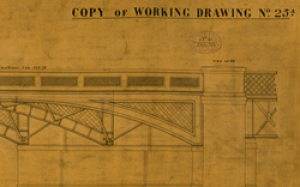Scotlands Railway archives brought to life online

Historic images of the original architectural drawings of the Forth Bridge, Paddington station and even Isambard Kingdom Brunel’s signature have been captured and published for the first time on a new Network Rail virtual archive, bringing together 19th century engineering and 21st century technology.
The website www.networkrail.co.uk/virtualarchive celebrates the heritage of today’s railway infrastructure and provides public access to view a special selection of the Network Rail archive, which holds over five million records.
Visitors to the site can chart the history of the railway’s most significant structures and stations including the Forth Bridge, the Tay Bridge, Box Tunnel, and many main line stations. The archive holds records by the most famous railway engineers including Isambard Kingdom Brunel, Robert Stephenson, Joseph Locke and William Henry Barlow.
Network Rail’s archivist Vicky Stretch explains why the online archive is so important: “The history of the railway is so fascinating with some of the oldest records dating back to the 1680s and Charing Cross station with Sir Christopher Wren’s signature. The drawings and documents we hold are an absorbing window to understanding the incredibly detailed and beautiful architectural work carried out by some of the world’s greatest engineers, and are still important for engineers working today.
“We can’t yet showcase anywhere near the five million records we hold but we’ll publish new images and documents all the time and through the ‘ask the archivist’ and blog sections we can share more. We hope this will be a great resource for enthusiasts, historians, architects and students alike. Now everyone can enjoy these amazing drawings and historical documents and learn more about how the railways made Britain what it is today.”
ADVERTISEMENT
While the drawings date from the earliest days of the railway they are still useful operational records today, as many show information such as foundations and original construction details. The drawings signed by Brunel of Box Tunnel tell us exactly how that tunnel was constructed and this is still important to the running of the railway today.
The oldest records Network Rail holds are from the deeds collection. This collection charts the history of all the land the railway is built on. A set of deeds from 1684 relating to the land Charing Cross is now built on, bears the signature of Sir Christopher Wren (land he once owned was in the 19th century sold to the railway).
With only a small section of the five million articles available for the first phase of the virtual archive, visitors are invited to ‘ask the archivist’ questions about the collection. Enthusiasts can also for the first time purchase a print of their favourite railway image. Network Rail is working with Mediastorehouse to enable people to buy or licence high quality digital images for instant download as well as prints (including framed prints and canvases), key rings, magnets, mugs, mouse mats, jigsaws and greetings cards. All profits from this commercial activity will go back into helping Network Rail manage, maintain and improve Britain’s railways.
The website also has social media sharing functionality, which encourages people to share images with their friends and families.

